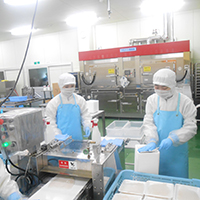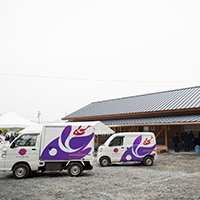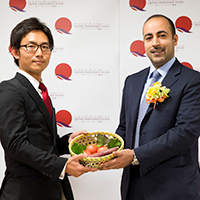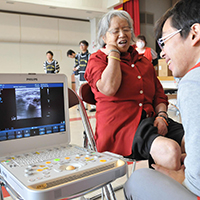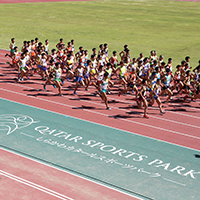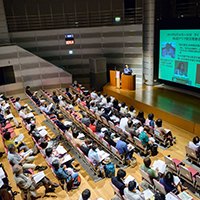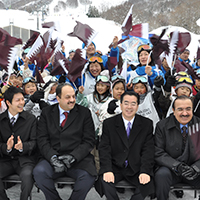Below are seven further projects in the fields of fisheries, health care and education that the Qatar Friendship Fund (QFF) has assisted financially.
Keeping marine products fresh
In association with the Kamaishi Otsuchi Industrial Research and Development and Training Center, the QFF helped Kamaishi Hikari Foods Co. with $1 million in aid to introduce a system that freezes marine products without destroying cell membranes in the city of Kamaishi, Iwate Prefecture.
The project aimed to regenerate the fishing industry in the city with the implementation of advanced freezing technologies for preserving seafood products for transportation.
The introduction of the system enabled the creation of the senary sector, which is an integration of the primary, secondary and tertiary sectors, through value added products and nationwide direct sales.
Restoring vital industry
In the Karakuwa area of Kesennuma, Miyagi Prefecture, about four out of five households were engaged in work related to the fishing industry before the March 11 disaster struck.
Following the devastation caused by tsunami, the QFF funded a $1.8 million fishing project, dubbed "Al Furdha," in partnership with Nippon International Cooperation for Community Development. Al Furdha means window to trade in Arabic.
Launched in May 2014, the facility is equipped with the latest fish preservation technologies to enable fishery operators to keep their catch alive before sales.
At the opening ceremony of Al Furdha, Qatar's Ambassador Yousef Bilal stressed that the fishing industry is the key for the recovery of Tohoku.
"I hope that Al Furdha will develop together with the people in Karakuwa, including local anglers, buyers, restaurateurs and women in the area, while contributing to the reconstruction of Tohoku," he said.
The facility is also used as a venue for giving children dietary education, as well as cooking classes.
Reconstruction through farming
In the city of Kesennuma, Miyagi Prefecture, Eco & Health Food Lab promoted a project titled "Farming to Regain Livelihood" with $500,000 in assistance from the QFF.
The initiative set out to provide communities with vegetable planters and solar power generator kits to bring people together to grow and sell their own produce.
The goals of the project was to bring back family relationships and smiles on children's faces through workshops on growing vegetables, creation of family dialogues, sales of the resulting produce, development of local companies to buy and sell the produce to create jobs and use the sales networks previously created to also cover marine products.
Through the project, planters were provided at 400 locations and solar power kits were installed in 40 allotment gardens in the city, bringing hope to 50,000 people.
Health care relief
The QFF places importance on supporting health care in disaster affected communities and helping both the physical and mental recovery of victims so they can rebuild their lives as well as sustain their livelihoods.
The fund promotes a project dubbed "Building a Healthy Community in Tohoku" to provide assistance to the disabled and elderly in Iwate, Miyagi and Fukushima prefectures, working with the Association for Aid and Relief Japan and Morioka Municipal Hospital.
The goals of the project include providing playground equipment for children with disabilities and establishing libraries in a facility for such children. Moreover, the program set out to provide health promotion activities such as massage, counseling, screening for early detection and prevention of deep vein thrombosis.
Recovery through sport
Qatar Sports Park Shirakawa is a project aiming to invigorate the community and improve the health of residents in the city of Shirakawa, Fukushima Prefecture.
The QFF provided $7.9 million to refurbish an athletics track and gymnasium, as well as to construct the Annabi Sports Plaza indoor sports facility.
When the earthquake struck in 2011, the local gymnasium and other facilities were used as evacuation centers for families seeking shelter from the Fukushima No. 1 nuclear power plant disaster. The fallout from this tragedy meant outdoor activities were severely disrupted thereafter.
"The Great East Japan Earthquake altered the lives of millions in Japan — people's housing, livelihoods and own sense of security," then-Minister of Foreign Affairs of Qatar Khalid bin Mohammad Al Attiyah said at the opening ceremony held in the city in February 2015. "For the people of Fukushima Prefecture, this also meant an unparalleled disruption in their way of life and in the very organization of their community."
"We are truly delighted that the Qatar Sports Park Shirakawa has been completed and can now serve all community members, whether young or old. It is my hope that this wonderful project will contribute to the region's recovery and serve as a place where people can come together in their passion for sports and community building," he said.
Disaster-resilient society
As part of fostering human resources for the reconstruction of Tohoku, the QFF supports the "Policy Advocacy and Leadership-Building for a Disaster-Resilient World Project," which is managed by the Japan Women's Network for Disaster Risk Reduction (JWNDRR) and the Japan Association for Women's Education.
The initiative aims to provide greater opportunities for women in Japan to influence the nation's disaster preparation and recovery process.
The QFF awarded $340,000 to the project, which aims to ensure that the experiences of the thousands of women affected by the March 11 quake are reflected into future planning efforts, thereby reducing the risk of injury, loss of life and damage to infrastructure in natural disasters.
"Fifty-four percent of those that lost their lives when the disaster struck the East Coast of Japan in 2011 were women and girls. For those that survive such a tragedy, being able to share their experiences and contribute to a safer future is paramount," said Qatar's Ambassador Yousef Bilal.
"Beyond the disasters themselves, it's important to make sure that both women and men feel that they are part of the rebuilding process. In this regard, the QFF can act as a bridge and an enabler. I am delighted that we are supporting this critical initiative," he added.
Akiko Domoto, president of the JWNDRR, has worked closely with women in Tohoku after the disaster and noted the significance of the project and shared her hopes that these indispensable lessons are learned.
"It's essential for local leaders, teachers and families to have correct knowledge in their possession when it comes to reducing the risks posed by disasters and offering the same level of protection to all, regardless of age or gender," she said.
"To be effective in reducing the damage caused, injuries sustained and the loss of precious lives, we cannot compromise. Our friends in Qatar have given us great support and encouragement and our long-term activities will work toward cultivating leadership skills that reduce the impact of future disasters for all," the former governor of Chiba Prefecture added.
The project held a public forum at the Third U.N. World Conference on Disaster Risk Reduction in Sendai in March 2015, attracting 277 participants from 13 countries.
Winter fun
In January 2012, the QFF helped organized the "Yukinko Snow Camp" (Fun in the snow camp) in the city of Yubari, Hokkaido.
The one-off event brought smiles to the faces of 1,400 children and family members from the disaster-hit areas through a ski education program. They were caught in the hardship of disaster and restricted from outdoor activities because of the nuclear accident in Fukushima Prefecture.
In addition to the ski program, participants enjoyed an excursion to the famed Asahiyama Zoo in Asahikawa, Hokkaido.
Information was provided by the Qatar Friendship Fund.

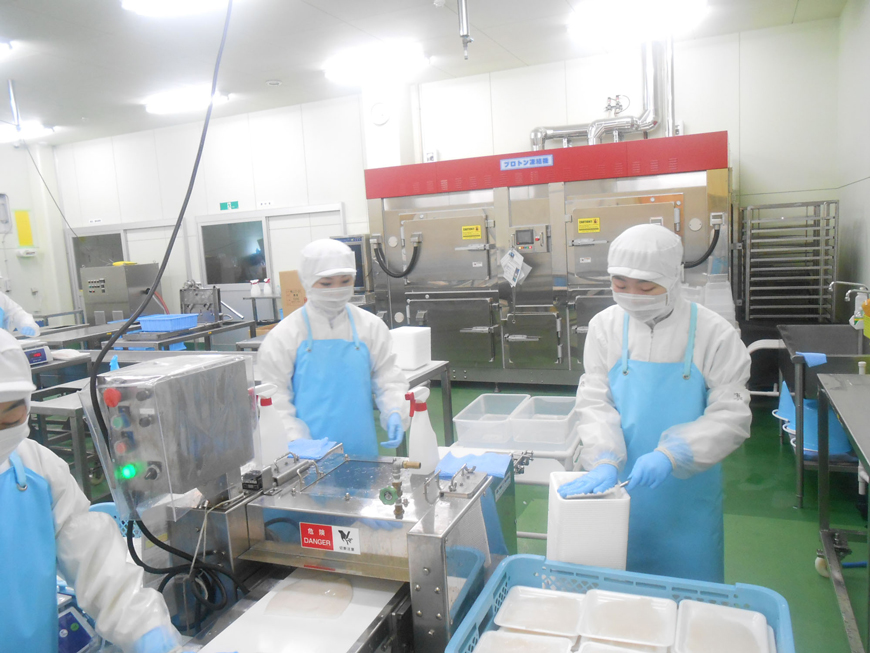
 Click to enlarge
Click to enlarge